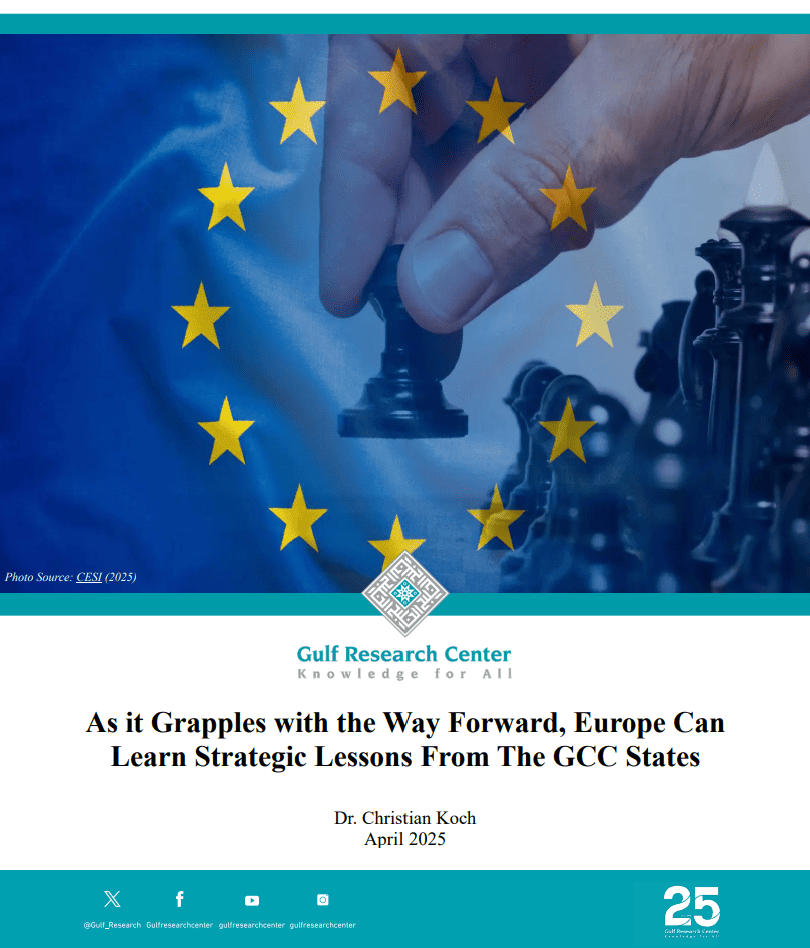Select any text and click on the icon to listen! ByGSpeech
ByGSpeech
 ByGSpeech
ByGSpeech ByGSpeech
ByGSpeech
As the European Union (EU) grapples with economic stagnation, bureaucratic inertia, and global strategic challenges, it could take a lesson from some select strategic approaches that the Gulf Cooperation Council (GCC) countries have adopted in recent years. In light of the “Strategic Partnership” guiding EU-GCC relations since 2022, the institutional contacts between the two sides have strengthened considerably, thanks in part to their many shared interests, and given the fact that GCC states have already had to deal with some of the same issues that now confront the EU, a closer look at the GCC’s developmental path is worthwhile. The Gulf states have demonstrated a high degree of agility in navigating similar challenges, combining state-led transformation, economic diversification, and pragmatic diplomacy.
As a core element charting their future course of action, the GCC countries deploy unified, longterm national visions to serve as roadmaps for economic diversification, governance transformation, and social development. This is particularly important as the Gulf states seek to reduce their dependency on oil revenues and position themselves in the rapidly evolving global order. Examples include Saudi Vision 2030, UAE Vision 2071, Oman Vision 2040, and Qatar’s National Vision 2030. The primary purpose of such documents is to align government and societal actors toward common transformation goals. As such, these visions have proven to be integral in terms of focusing policy plans on clearly identified targets with a forward-looking narrative that outlines where a country sees itself in 10, 20, or even 50 years.
These national visions tend to be accompanied by a clear set of goals to be met within an identified timeframe. In Saudi Arabia’s Vision 2030, for example, one target is to increase the private sector's contribution from 40% to 65% of the GDP while lowering the unemployment rate from 11.6% to 7%. The UAE Vision seeks to improve its education system to where students will rank among the best globally in reading, mathematics, and science assessments. To assess progress towards the set targets, regular review mechanisms are undertaken with a readiness to make adjustments and additional efforts as needed.
By and large, EU member states have been unable to enhance their strategic cohesion and implementation by centralizing and communicating through long-term visions. While efforts have been made at the EU level (e.g., the Green Deal and the Digital Decade), the implementation of cross-institutional delivery units and performance-based frameworks still falls short.
In terms of governance modernization and talent development, the GCC states have been rapidly reforming their legal frameworks, digital governance, and civil service structures to improve efficiency and global competitiveness. Reforms such as the UAE's Golden Visa scheme, for example, have better positioned the country in terms of talent attractiveness in sectors like advanced technology and AI. Numerous key reforms and digital initiatives have reduced red tape, simplified government procedures, and improved service delivery across the region. The UAE “Smart Government” initiative offers over 3,000 government services online or via mobile apps, while in 2021, Dubai became the world’s first government to go 100% paperless. In Saudi Arabia, the “Meras” platform allows entrepreneurs to set up a business within an hour, and Oman has introduced a single-window clearance for industrial licenses. At a time when bureaucratic inertia and obstacles are hampering Europe’s competitiveness, Europe should seek to implement faster, data-driven administrative reforms with a clear focus on service delivery and digital transformation. Europe must further modernize its migration policy to strategically attract global talent, particularly in high-demand sectors, to address demographic and labor market gaps.
The GCC states have also committed themselves to massive investments in non-oil sectors, such as renewable energy, AI, and tourism, to reduce their resource dependency. GCC sovereign wealth funds support innovation and have added to the Gulf’s global economic leverage. Here, Europe needs to strengthen public-private partnerships, reindustrialization efforts, and strategic use of sovereign investment tools to accelerate innovation and reduce technological dependencies.
Investments in cultural diplomacy, major events (e.g., Expo 2020 and 2022 and FIFA World Cup 2034), as well as space programs have bolstered the GCC’s global visibility and influence. This has contributed to nation branding and expanding the region’s soft power and attractiveness. The EU could equally better leverage its tremendous cultural capital, scientific leadership, and global partnerships to revitalize its international brand and attractiveness.
Finally, there is the field of international relations and security. Similar to Europe, the GCC states have faced the issue of creating greater strategic autonomy in terms of their foreign and security policies. Doubts about the reliability of the United States have persisted for several decades, to the extent that the GCC states have gradually adopted a policy of multi-alignment. While the Gulf states maintain strong Western ties, they are simultaneously engaging with China, Russia, and other powers to enhance their geopolitical leverage. Here, their geographic location at the crossroads of Europe, Asia, and Africa serves as an advantage.
With the second Trump administration making it clear that Europe can no longer rely on its transatlantic partner, Europe must also adopt a similar more flexible, issue-based diplomacy to bolster its own strategic autonomy, particularly in areas such as security, technology, and energy policy. The GCC states have followed such a path for the past two decades, and some of the results are now becoming visible. This underscores the urgency for Europe to act sooner rather than later. While GCC models are not directly transferable to Europe due to structural and governance differences, the targeted adaptation of best practices in economic strategy, governance innovation, and global positioning can help Europe navigate its current challenges with renewed clarity and competitiveness. With ties between the GCC and the EU growing, valuable lessons can be transferred in a mutually beneficial way.
Dr. Christian Koch is the Executive Manager of the Gulf Research Center Foundation office in Brussels (GRCF-B) and the Director of Research of the GRC.